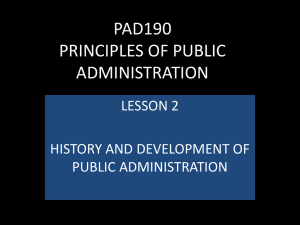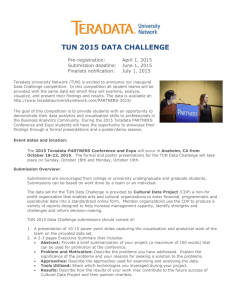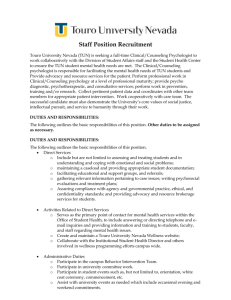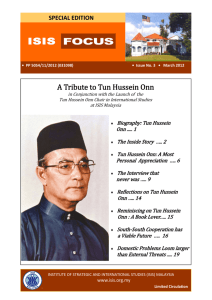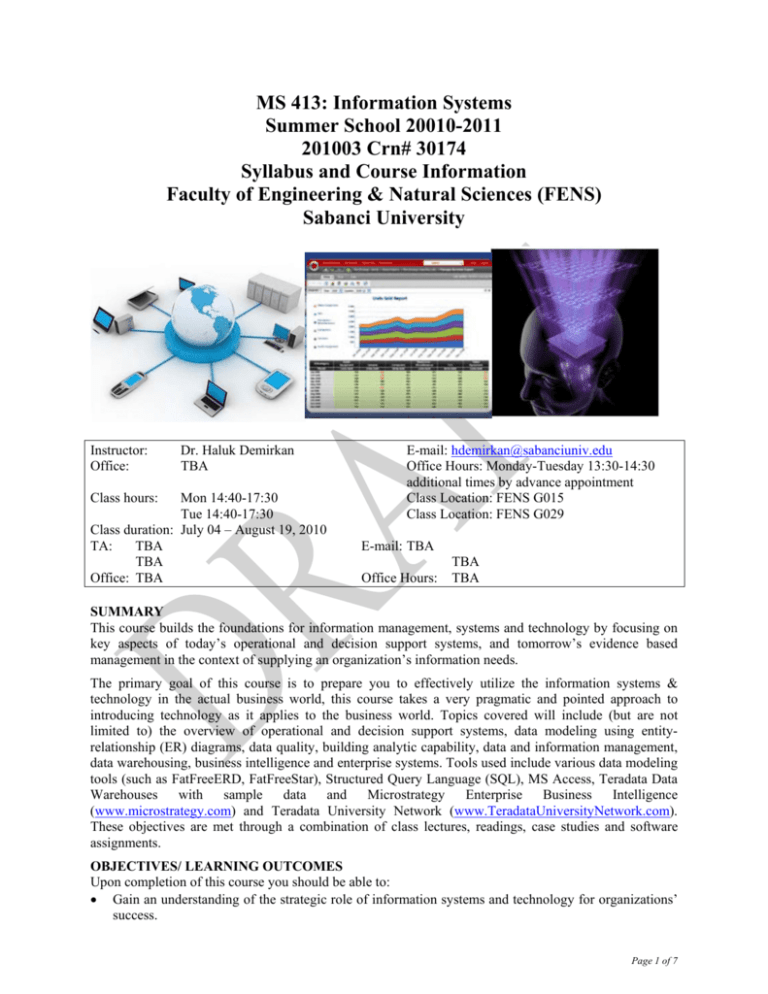
MS 413: Information Systems
Summer School 20010-2011
201003 Crn# 30174
Syllabus and Course Information
Faculty of Engineering & Natural Sciences (FENS)
Sabanci University
Instructor:
Office:
Class hours:
Dr. Haluk Demirkan
TBA
Mon 14:40-17:30
Tue 14:40-17:30
Class duration: July 04 – August 19, 2010
TA:
TBA
TBA
Office: TBA
E-mail: hdemirkan@sabanciuniv.edu
Office Hours: Monday-Tuesday 13:30-14:30
additional times by advance appointment
Class Location: FENS G015
Class Location: FENS G029
E-mail: TBA
Office Hours:
TBA
TBA
SUMMARY
This course builds the foundations for information management, systems and technology by focusing on
key aspects of today’s operational and decision support systems, and tomorrow’s evidence based
management in the context of supplying an organization’s information needs.
The primary goal of this course is to prepare you to effectively utilize the information systems &
technology in the actual business world, this course takes a very pragmatic and pointed approach to
introducing technology as it applies to the business world. Topics covered will include (but are not
limited to) the overview of operational and decision support systems, data modeling using entityrelationship (ER) diagrams, data quality, building analytic capability, data and information management,
data warehousing, business intelligence and enterprise systems. Tools used include various data modeling
tools (such as FatFreeERD, FatFreeStar), Structured Query Language (SQL), MS Access, Teradata Data
Warehouses
with
sample data and Microstrategy
Enterprise Business Intelligence
(www.microstrategy.com) and Teradata University Network (www.TeradataUniversityNetwork.com).
These objectives are met through a combination of class lectures, readings, case studies and software
assignments.
OBJECTIVES/ LEARNING OUTCOMES
Upon completion of this course you should be able to:
• Gain an understanding of the strategic role of information systems and technology for organizations’
success.
Page 1 of 7
•
•
•
•
•
Understand the fundamentals of transactional and decision support systems in the business world.
Learn fundamentals of database management, and relationship between data, information and
knowledge
Understand the foundations of data warehousing and business intelligence and how they can improve
your organization’s decision making.
Describe the evidence based management.
Understand the overview of enterprise systems.
WHAT ARE THE PREREQUISITES?
It is helpful, but not required, for students to have taken a database course, or have previous database
work experience. There is no programming knowledge or experience is needed for this course. We will
use a very simple language, Structured Query Language, to retrieve data from databases. It is not a
programming language (http://tr.wikipedia.org/wiki/SQL) (http://en.wikipedia.org/wiki/SQL).
WHAT ARE THE REQUIRED TEXTBOOKS AND READINGS?
• All reading materials will be available on-line (through mySU).
Most of the course materials are available on the Teradata University Network
(www.TeradataUniversityNetwork.com). TUN is a free resource sponsored by Teradata and vendor
partners, such as MicroStrategy. The site includes articles, webinars, software, and even Teradata
certification. In the schedule, any material with a prefix of TUN can be downloaded from this website for
free.
In order to use TeradataStudent/University Network, students need to register at
http://www.teradatauniversitynetwork.com/templates/request-student-access.aspx,
TEACH&LEARN > includes content, such as articles, case studies, power points
APLLY&DO > includes access to the software packages such as Teradata Database, MicroStrategy, and
download sites for the modeling tools FatFreeERD, FatFreeStar.
In addition to the course textbook, notes and cases, additional reading materials, sample study questions
will be handed out in class, or be available through the course website. Some readings and/or class notes
may not be discussed in class; they might be just supplemental materials.
Additional References:
• Modern database management / Jeffrey A. Hoffer, Mary B. Prescott, Heikki Topi
Upper Saddle River, NJ: Pearson/Prentice Hall, 2009, 2007, 2005
• Business intelligence: a managerial approach/ Efraim Turban... [et al.].
Upper Saddle River, N.J.: Pearson Prentice Hall, c2008.
*** THESE BOOKS WILL BE ON RESERVE AT THE INFORMATION CENTER ***
WHAT HAPPENS DURING THE CLASS SESSIONS?
End of this syllabus you will find a tentative course outline showing the details of the course sessions.
Some aspects remain “TBA”, but those will be addressed as the class interests are ascertained. The course
will include the following methods of learning:
• Instructor Led Lectures to build the framework of MS 413 Information Systems: Limited portions
of class sessions will devoted to traditional “lectures” and discussions around foundations, concepts,
frameworks and models that may be applied to a real-life situation.
• Technology Discussions and Experimentation: A few class sessions will be devoted to hands-on
computer application use for exposure to technologies exemplifying innovative uses of IT for
supporting decision-making.
Page 2 of 7
EXPECTATIONS:
The topics covered in this course are difficult to master without substantial amount of effort. You will
need a great deal of time for reading, experimenting and practicing the material. Read the assigned
material and complete the assignments. Don't get behind and don't miss class. New concepts build on
earlier concepts. Attendance is strongly suggested. If a student must miss a class, he/she is responsible for
getting a copy of the assignment from his/her classmates or the class website.
HOW WILL MY PERFORMANCE BE ASSESSED?
Your assessment in this course will have the following components at the weights shown:
Item
Format
1. Attendance, classroom contribution, in-class exercises &
peer evaluations
2. Homework assignments
3. Pop-up Quizzes
4. Project
5. Midterm Exam
6. Final Exam
Individual
%
Allocation
5%
Group/Individual
Individual
Group/Individual
Individual
Individual
5%
20%
20%
25%
25%
1. Attendance, classroom contribution, in-class exercises and peer evaluations
Class Attendance: Attendance is strongly suggested. Failure to having less than 70 % of class attendance
check will result of an automatic 0% (out of 5%) allocation for item.
For assessing your class contribution, we will rely on as many relevant 360 degree feedback measures as
possible. In addition to the evaluation by the instructor, you will often be asked for peer evaluations of
group members and evaluations by rest of the class members. The grading criteria for evaluating class
contribution are listed on the last page. Time by time, you will also complete in-class exercises, quizzes
and turn in the results of your work
2. Homework Assignments
The assignments will be posted on the course website at least a week before the due date. Students are
encouraged to write his/her own assignment (i.e. no copying others’ work).
Assignment Return Policy
The solution methodology that you use should reflect the subjects covered in this course. Assignments are
to be turned in through the course website (online submission) at the beginning of class on the scheduled
date. E-mails will not be accepted. Unless the instructor has granted prior permission, any assignment
submitted after the due date will be assessed a penalty of 25% per calendar day. For example, an
assignment due on a Friday and submitted the following Monday would have a 75% penalty. Late
assignments should be turned in to one of the TAs where it will be date/time stamped (it is the student’s
responsibility to request a date/time stamp). Assignments without time stamps will be checked on the date
the instructor receives them.
All written work and class presentations should be of professional quality. Written work should be
designed for ease of reading. They should be printed on plain paper, single spaced, 12-point Times New
Roman font, one inch margins all around. Use header space for authors’ names. Use normal (default)
settings for other formatting such as character spacing, etc. Written communication is extremely
important in today’s business and academic world.
3. Pop-up Quizzes
Number of pop-up quizzes will be given closed course materials (from required readings and case
studies).
Page 3 of 7
4. Project
The project involves the development and/or implementation of a tutorial. When forming groups, it is
STRONGLY recommended that you communicate frankly about work schedules and grade expectations.
A clear understanding of group expectations and goals from the beginning may avoid many problems
later in the semester when everyone is under considerable pressure.
Teams will be administered as much like teams in organizations as possible. Team members will fill out
work contracts at the beginning of each group project and peer evaluation forms at the completion of the
project report. An important portion of the group case grade will be assigned based on group peer
evaluations. Additional information on project will be provided later in the semester.
Each team will be asked to submit a written project report based on the schedule. It is essential that group
members participate in the entire process, rather than assigning individuals to data analysis, report writing
etc. Several parts of the project will be done by individually, and the other parts will be done as a team. A
suggested format for the project report will be given in a separate document.
4. Midterm Examination
An individual, in-class mid-term exam will be given based on the schedule.
5. Final Examination
An individual, in-class final exam will be given based on the schedule.
There will be a single make-up examination on August 16 or 17. Any student who misses midterm or
the final exam will enter into this exam. Subject coverage will be the same as the final exam. A student
who wants to enter into the make-up exam needs to document the reason to miss the regular exam (such
as sickness or official appointment) and inform the instructor immediately before/after missing the regular
exam.
HOW DO I PREPARE FOR CLASS CONTRIBUTION?
You will also have to think on your feet and participate in discussions where you have to be aware of
group dynamics and how to best get an individual or a group to listen to you and accept and act on your
recommendations. The ability to cultivate and present your ideas, convincingly and tactfully, to an
audience is an important skill in management. To help cultivate these skills, all students are expected to
be fully prepared for each class by completing assignments (reading and writing) and participate actively
in class. For each class, you will be required to read one or more articles and/or a case study. As you
read, think about the problems and opportunities offered. If the articles (including those from earlier class
sessions) offer insights to the case, try to see how you can apply them. In order to get the most from this
class, you need to identify the major issues brought forth in the cases and come ready to share your views,
listen, build upon the discussion, offer alternatives and solutions, reason and justify your stand, and move
the thinking forward. Class sessions devoted to cases will be very interactive and all students will be
provided ample opportunity to participate. For preparing for a case study:
• Read the case and the associated reading material, if any.
• Read the discussion questions and analyze the case in their context.
• Meet with your study group (this is strongly suggested) and discuss the issues.
• Prepare your own notes with possible responses for each discussion question.
Most of the learning will occur while preparing, exchanging ideas with study groups, and participating in
the class discussions. Thus, your class’s learning experience depends on the level of responsibility you
take for contributing to the discussion. You are judged not by what you know, but by what you
contribute. You will not be penalized for comments that do not seem to be “right answers”; in fact,
seldom, are there any right answers. Although, taking up an advocating or a challenging position can be
discomforting for some; healthy disagreements, discussions, and problem-solving on a real-time basis are
day-to-day duties of most managers. The skills needed to contribute to case discussions are the same as
those needed to be responsible managers and effective leaders. Your obligation is not just to learn but also
to assist in the learning of your classmates. Effective class contribution is characterized by:
• Ability to listen. (Are you jumping to what “you want to say” without understanding earlier
comments?)
Page 4 of 7
•
•
•
•
•
Relevant contribution to discussion. (Do your comments relate to the comments of others…to the
themes that the class is exploring together?)
Adding to understanding of the situation. (Are you incisive? Do you cut to the core?)
Willingness to challenge ideas respectfully, not contentiously.
Integration of material from past classes, readings, cases, etc.
Testing new ideas, not being “safe”. (Are you analyzing/concluding and not just repeating facts,
comments?)
Miscellaneous Information:
Updates
Please be aware that the syllabus is tentative. The instructor can make changes on the schedule and the
order of subjects covered. If there is any change, the instructor will inform the class through the course
website. Therefore, please visit the course website frequently.
Web Site
More details on Examinations, Lectures, and Assignments will be available on the class web site under
Course Information. The material on course web sites is intended for class use only. It is not to be copied,
transmitted, or reproduced in any form without the written permission of the instructor.
How do we communicate? E-mail communication
All communication via e-mail should be professional in form, content, and tone. That means that the
message should have a subject indicating it is for MS 413 and begin with a salutation and the body should
explain the purpose of the message in proper English. The message should be signed with your full name
and noting the section you are in. Messages not conforming to this requirement will not be answered.
Grading policy
Final course grades will be assigned using the following guidelines: A 90-80-70-60 percentile grading
system is not used; instead, I accumulate grades and look for break points. This course will use the
plus/minus grading system.
There will not be any “extra” opportunity to increase an individual student’s course grade (such as an
extra project etc.) for whatever reason. I do not find such exceptional opportunities fair to other students.
Please do not ask.
Academic Integrity
The highest standards of academic integrity are expected of all students. Failure to meet these standards
may result in suspension or expulsion from the university and other sanctions as specified in the academic
integrity policies of the individual colleges.
The term “facilitating” includes active or inactive participation in academic dishonesty. Inactive
participation includes silent knowledge of violations. This policy relates to all homework, quizzes,
projects, and exams for this course. Please be forewarned that your instructor strongly agrees with this
policy, will strive to actively enforce it, and will support the harshest punishment for those who violate it.
Protect your Projects and home works. Don’t leave files on the hard drives of school computers, don’t
share your disks or printouts with others, pick up printouts as soon as they come off the printer.
What you can Share: Anything printed in either of your textbooks, any information given in class. Expect
to be interviewed if your project and homework solution looks similar to anyone else’s in the class.
Tentative Course Outline:
This is a very tentative schedule. More accurate schedules will be shown in class in week segments. You
should read the assigned materials before the class we will be discussing the material.
Page 5 of 7
The instructors reserve the right, when necessary, to alter the grading policy, change examination dates,
and modify the syllabus and course content. Modifications will be announced in class. Students are
responsible for the announced changes.
Week
Date
Topics will be covered
Readings and Assignments
Week
1
July
4
Introduction and review
Introduction to Teradata
University Network
Overview of
information systems
and technology
Data & information
Management
Optional Reading(s)
Modern Database Management (Chapter 1.The Database
Environment)
July
5
Entity Relationship
Diagramming
Relational Modeling
Week
2
July
11
July
12
Relational Modeling
Optional Reading(s)
Turban et.al Chapter 1 – Sections 1.1 & 1.2
Modern Database Management (Chapter 2.The Database
Development Process; Chapter 3.Modeling Data in the
Organization)
Due: HW1: Logical Data Modeling
Structured Query
Language (SQL)
Required Reading(s)
TUN PPT: Overcoming Decision Deficit Disorder: Tom Davenport,
4-5-2010
SQL
Physical database
design
Week
3
July
18
July
19
Required Reading(s)
TUN: Enterprise Rent-A-Car’s Data Warehouse Goes the Extra
Mile with Decision-Making Horsepower, Jerry Sanderson, 3-152010
TUN Video: Partners 2009 - Enterprise Rent-A-Car Video
Extract-TransformLoad (ETL)
Data warehousing
Extract-TransformLoad (ETL)
Data warehousing
Optional Reading(s)
Modern Database Management (Chapter 7.Introduction to SQL;
Chapter 8.Advanced SQL)
Due: HW2: Physical Data Modeling
Due: Project Part 1
Required Reading(s)
TUN Video: PARTNERS 2007 - Applebee's Video
TUN Article: Dirty Data No More: Five Tips for Data Governance
Optional Reading(s)
TUN Report: Taming Information Chaos
Modern Database Management (Chapter 9.The Client/Server
Database Environment; Chapter 10.The Internet Database
Environment; Chapter 11.Data Warehousing)
Due: HW3: SQL
Required readings(s)
TUN Case: Data Warehouse Governance At Blue Cross And Blue
Shield Of North Carolina
Optional Reading(s)
TUN Article: Best Practices in Active Loading: Real-time Data
Loading Tips and Techniques
TUN Article: Which Data Warehouse Architecture Is Most
Successful?
Due: Project Part 2
Required Reading(s)
Page 6 of 7
TUN Case: Watson, H.J., Wixom, Hoffer, Anderson-Lehman, and
Reynolds, “Continental Airlines Takes Off with Real-Time
Business Intelligence”
Required Reading(s)
TUN Video: PARTNERS 2008: Nationwide insurance
Week
4
July
25
Data warehousing
Midterm
Will be conducted in the regular class period
Week
5
July
26
Aug
1
Intro to OLAP and
Business Intelligence
(BI)
Sample enterprise BI
applications
Due: HW4: Dimensional Modeling Aggregate Problem
Aug
2
Week
6
Aug
8
Aug
9
Week
7
Intro to OLAP and BI
Sample enterprise BI
applications
Business analytics and
visualization
Business analytics and
data visualization
Business performance
management
Aug
15
Business performance
management
Aug
16
Final Exam
Required Reading(s)
TUN Case: Data Warehousing Supports Corporate Strategy at First
American Corporation
Optional Reading(s)
TUN Article: The Quest for Customer Data Integration
Turban et.al Chapter 1
Due: Project Part 3
Required Reading(s)
TUN Case: Watson and Volonino, “Harrah’s High Payoff from
Customer Information”
TUN Tutorial: Watson, J.H., “Business Intelligence: Past, Current,
and Future”
Optional Reading(s)
TUN Article: Markarian, Brobst, and Bedell, “Critical Success
Factors Deploying Pervasive BI”
Required Reading(s)
TUN Article: Davenport, Cohen, and Jacobson, "Competing on
Analytics”
Optional Reading(s)
TUN Article: Few, "Dashboard Design: Beyond Meters, Gauges,
and Traffic Lights”
TUN Web seminar: “What Is Data Mining?”
Due: Project Part 4
Required Reading(s)
TUN Case: Houghton, El Sawy, Gray, Donegan and Joshi,
“Vigilant Information Systems for Managing Enterprises in
Dynamic Supply Chains: Real-Time Dashboards at Western
Digital”
Optional Reading(s)
Turban et.al Chapter 3
Due: HW5: TUN Assignment: Software/
Downloadable/Assignment Using Tableau on Data Visualization
Optional Reading(s)
TUN Article: Watson, “Dashboards and Scorecards,” Business
Intelligence Journal, Spring 2006.
Turban et.al Chapter 5
TUN Article: Gregory, "Keys to Successful Performance
Management”
Page 7 of 7

